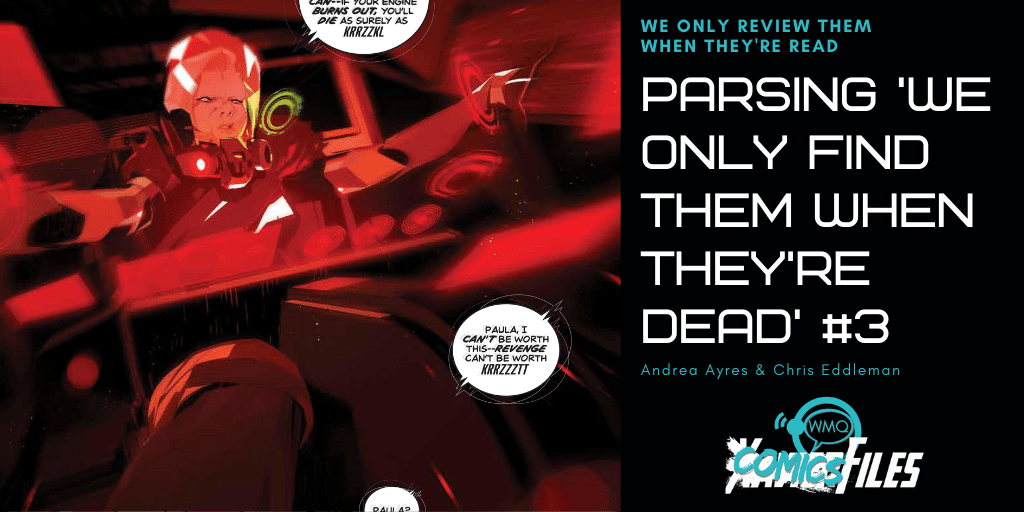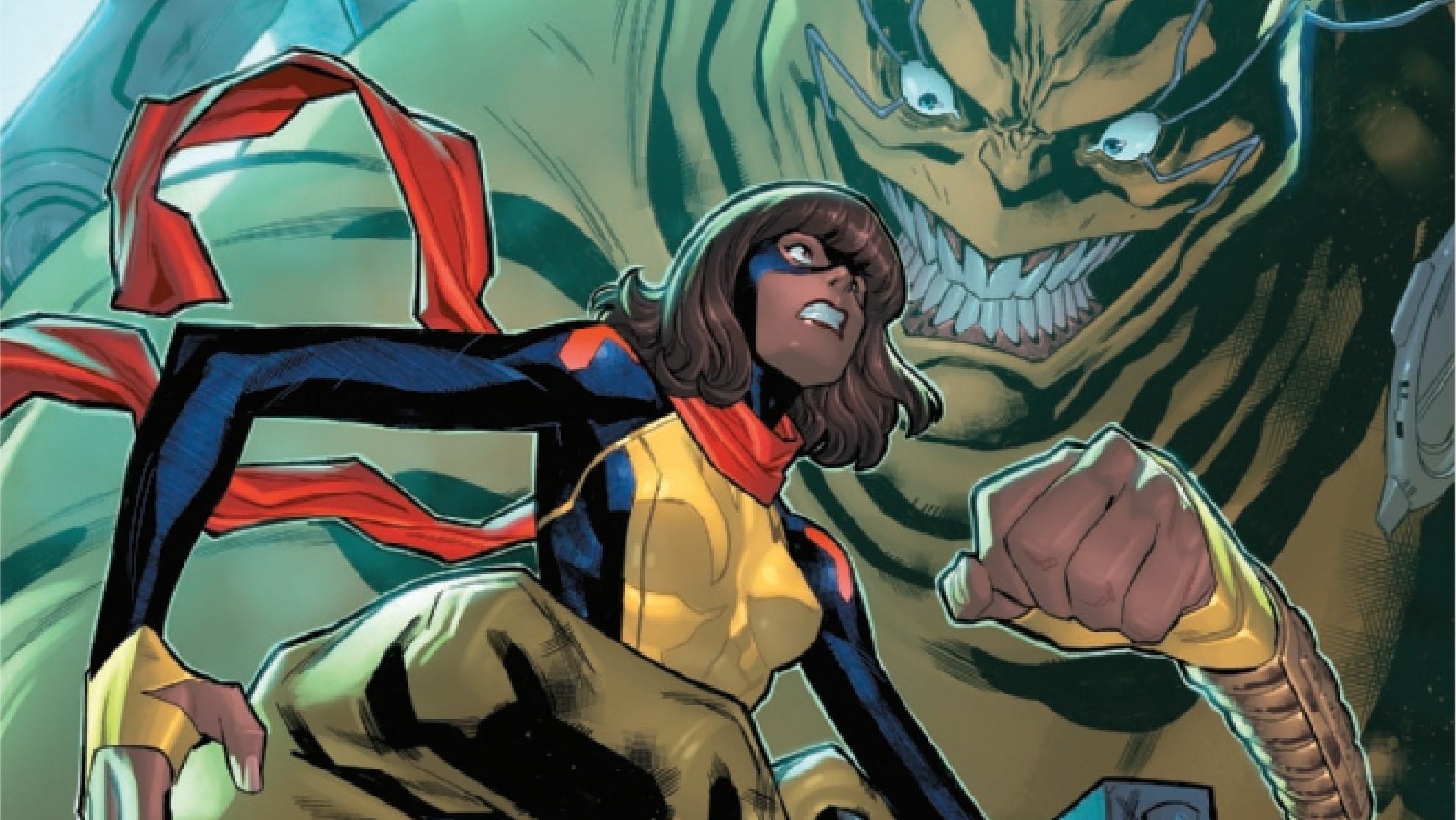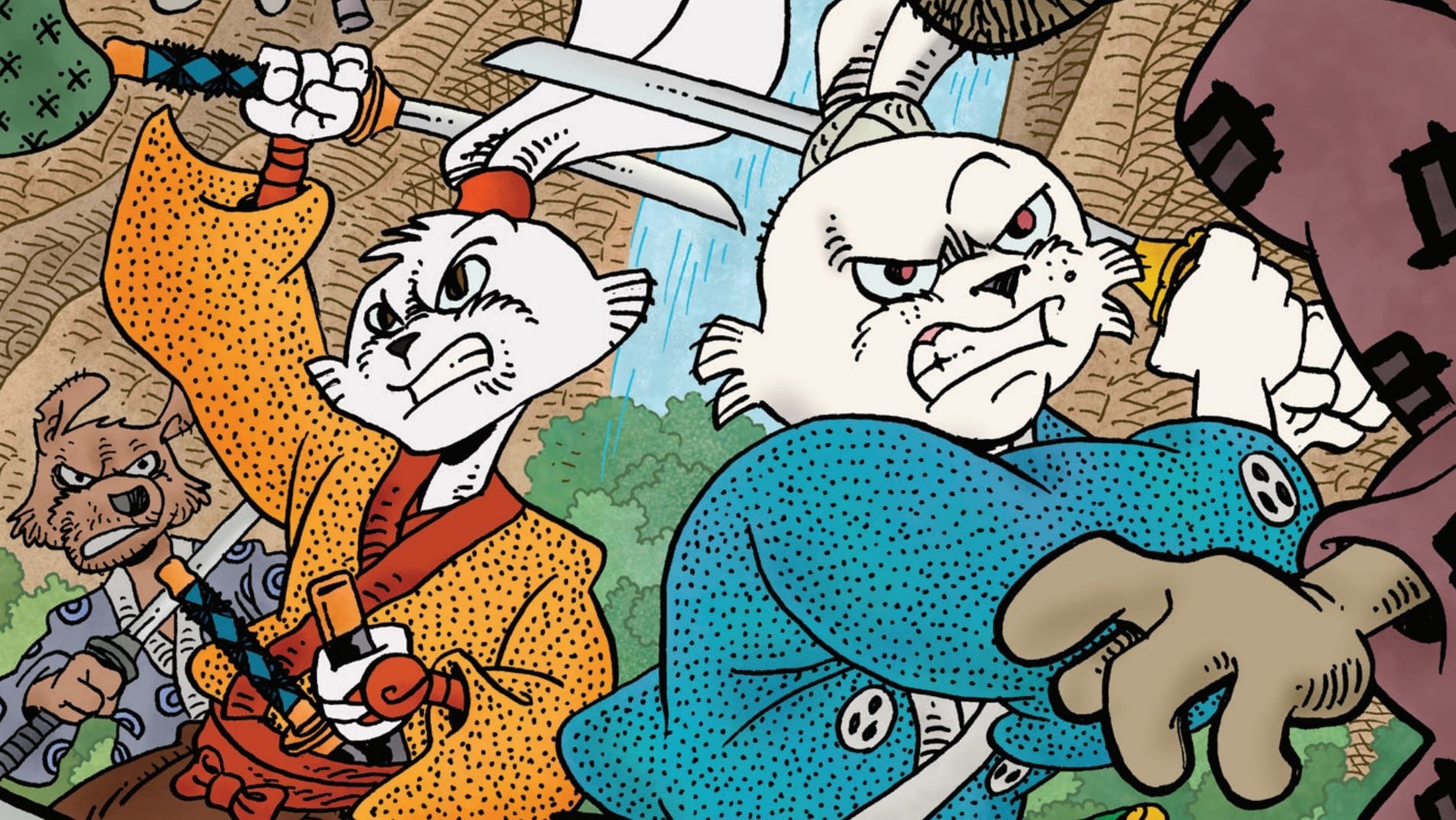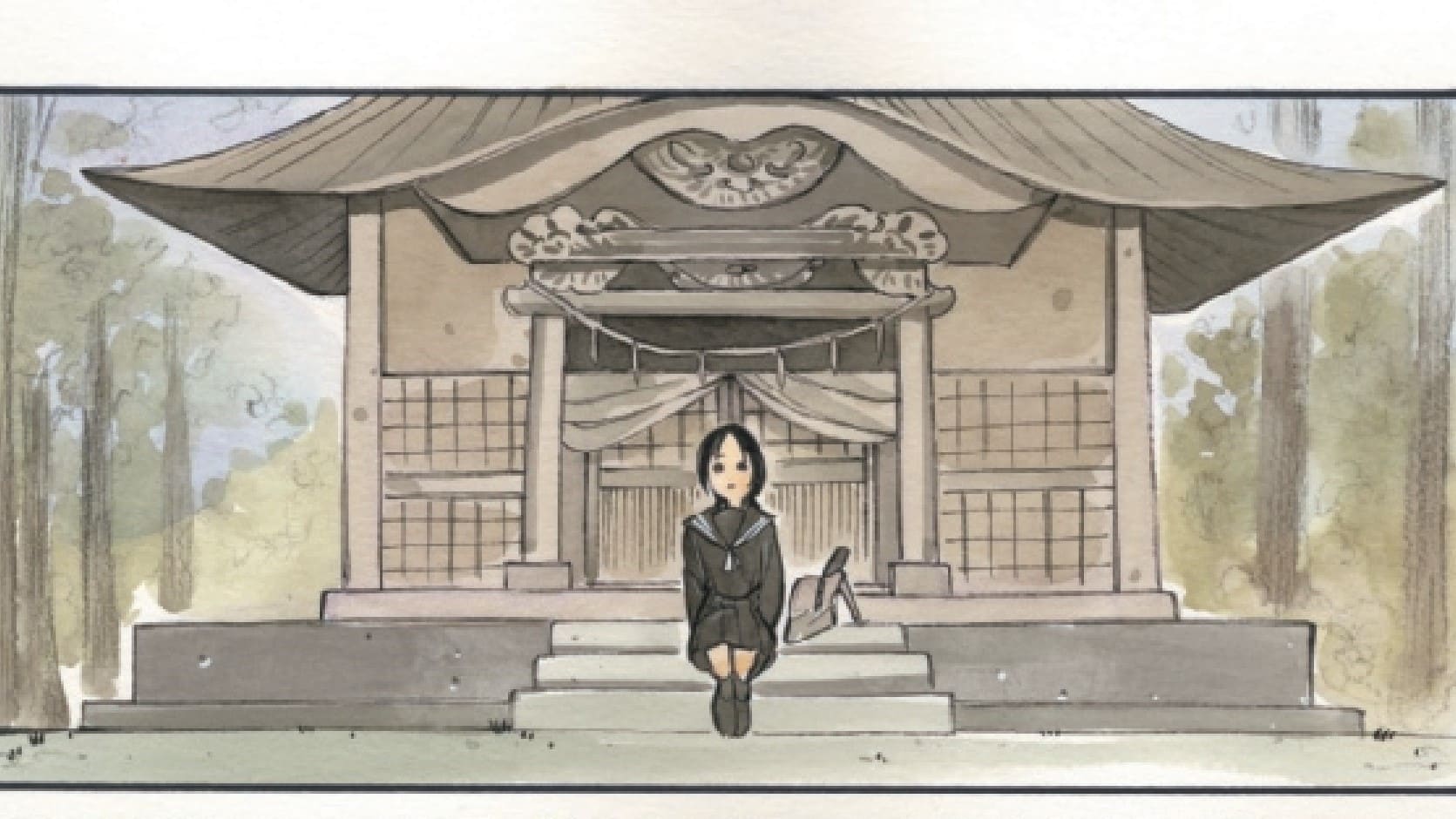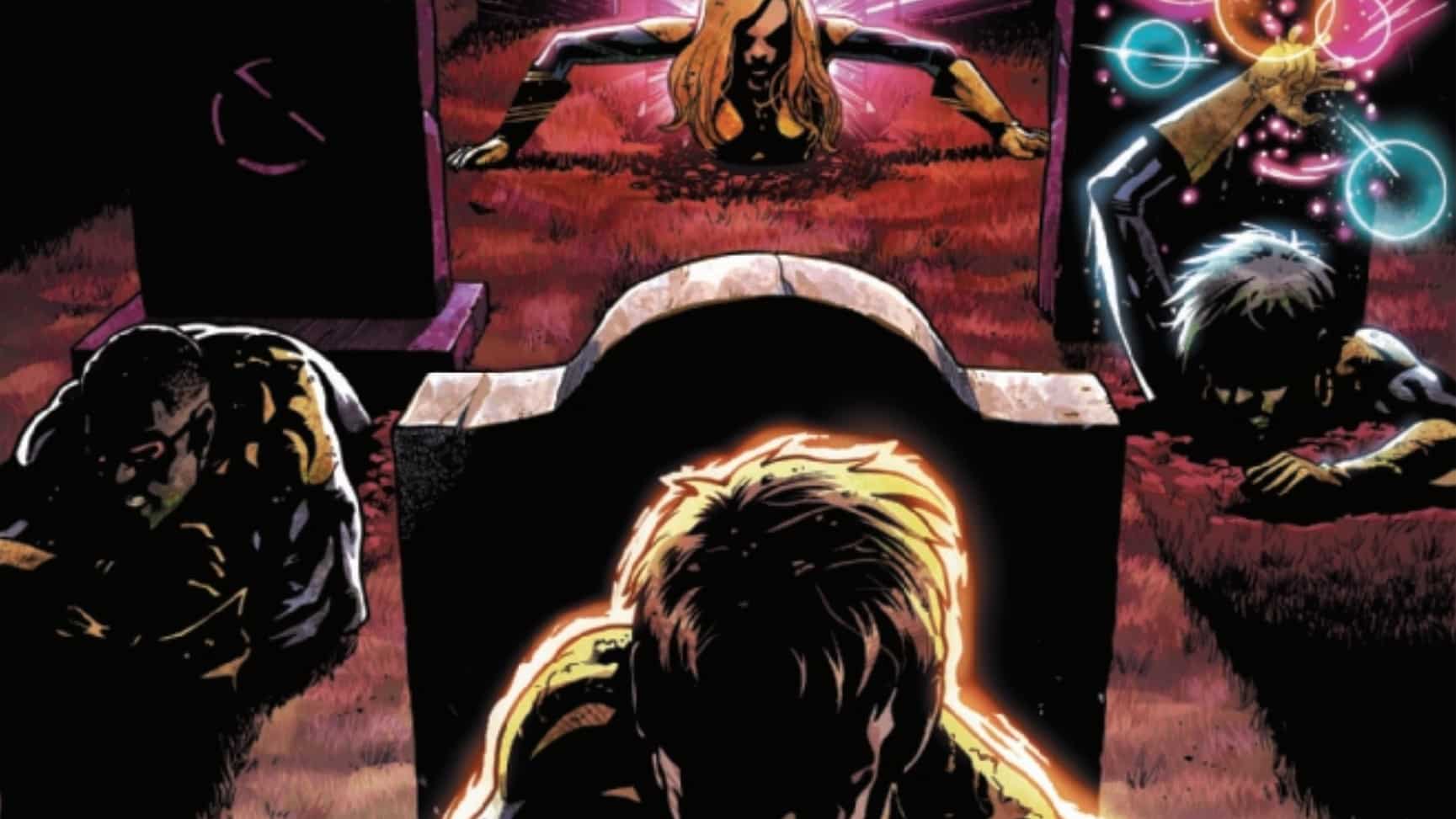Captain Malik and the crew of the Vihaan II are trapped in warp space, as they’re pursued by the mysterious government agent Richter. They have two choices: drop out of warp speed and risk being destroyed by Richter, or stay in warp until their engines explode from overheating. Who will survive long enough to discover a living God? Andrea Ayres and Chris Eddleman continue their A-to-Z examination of Al Ewing, Simone di Meo, Mariasara Miotti and AndWorld Design’s We Only Find Them When They’re Dead.

Chris Eddleman: Andrea, it’s a time for dead gods. Even more so than when Al Ewing, Simone di Meo and the rest of the crew began this comic a few months ago. It’s been incredibly fulfilling checking out your columns with Zach Rabiroff (who has decided to exit for now), and I’m thrilled to try to fill the large metallic boots left for me. As we venture into the unknown, let’s dissect another chunk of the body that is this comic. My metaphors are getting pretty gross, so maybe I’ll just swing it back to you. Protein and sugar carbohydrates for everyone! Thank you for having me, Andrea.
Andrea Ayres: First, I must say welcome and thank you for agreeing to write about the god meat with me. Issue #3 charts us along the course we’ve known was coming since our first encounter with Malik and the rest of the crew aboard the Vihaan II; we get to meet a live god. WOFTWTD is filled with slow time and quick; it’s the dance of space unfolding before us. The emptiness of space is filled with all of us, together. Or is it really every crewmember for themselves? I guess we should discuss. Tuck in, Chris, we’re dropping out of warp.
4.5 on the Richter Scale

AA: Paula, Paula, Paula. What are you doing? We get more of a sense in this issue of what went down between Paula and Malik with the brief flashback. Paula is looking well, a little worse for wear, but I guess that’s to be expected when your ship decompresses in space. There’s some exposition from someone we presume to be a doctor narrating her condition to us. “It was nobody’s fault. An act of god.” It’s a curious line. Is it an act of a god or the God? Is the language simply a relic? Either way it got my wee antennae perked up a bit. What’d you think about the opening gambit here?
CE: The structure of this series seems to be “flashback to 30 years prior followed by a return to the present with newly presented story information.” This is probably my favorite one of those. The way di Meo portrays the incredibly worse-for-wear Paula in a large panel, covered in bandages and looking almost older than she is 30 years hence, is a raw portrayal of the conditions she needed to enact vengeance. As to the god comment, it’s hard to not perk up a little bit anytime god or God is mentioned in this text. As this series continues, it’s hard not to read into it metaphorically, and how much it seems a bit like a comic about the creative process. The gods in this story are mined ideas, specifically how Jack Kirby’s work has been piecemealed and homaged, pastiched and ripped off for decades now. Ewing and di Meo are playing on the edge of that space, trying to make commentary while also doing this themselves.
It may be a little too on the nose, but the act of god seems to be a bit like “at the mercy of the plot itself.” But also does this phrase mean “an act perpetrated by god” or “an act associated with god”? Again, maybe a bit too on the nose either way. It’s just interesting to me that even though the gods in this tale are deceased (mostly?), they still drive the story and the characters one way or the other. Deus ex machina, indeed.
AA: Well, I think you’ve absolutely nailed that bit for me. There’s also the obsession with finding a live god. Finding a new god to supplant the other as if this would get Malik closer to the kind of truth he appears to be in search of. There’s also the audience dynamic you refer to here, the need for fans and readers to find the new thing that reminds them of the other. People have a sense that if they can interrogate something they can get closer to a truth, a reality that will reveal all to us. That kind of truth doesn’t exist, but it doesn’t prevent us from looking for it.
I feel like there’s a larger lesson here in understanding who and how we come to trust people. How do we establish truth, and why do we implicitly trust some folks over others? Naturally, there’s great research into this. Timothy Levine’s research into truth-default theory builds on the accepted idea that people are biased to believe others are telling the truth. People also believe we are quite good at detecting deception, but if Malik is any indication of our relationship with truth, we aren’t nearly as good as we think.
It appears by the way di Meo has rendered the edges of panels that Paula is in a thought sequence. When we are brought back to present time (2367), we pick up where we left off from issue #2. Malik continues his efforts to plead with Richter over the comm channel. Paula remains completely uninterested in giving up her pursuit. I can’t help but get the feeling whatever Paula and Georges are engaged with here, the crew of the Vihaan will be the sorry victims of their game. There’s something about the tension between Paula and Georges I can’t feel in the way I think I should. At least to the degree I presume Ewing wants us to feel. There could be a few reasons for this.
Much of our emotional relationship with Richter is based on a pulled back, distorted visual rendering. Not only does this distance us from her character but it gives a sense of distortion. It’s a reminder that we’re seeing her story from a vantage point we don’t have direct control over or influence on as a reader. That’s not to suggest we ever do in comics, but readers are made to feel more active by how the narrative is encapsulated. When we are close to the action, close to the characters’ expressions, we feel as if we have more control and say over them.
Also, if memory serves me correctly, Paula’s body positioning has been relatively the same from issue to issue. We’re only seeing one side of Paula, almost literally. This flashback is one of the first instances we have of getting information about Paula that isn’t filtered through Malik’s relationship with her. Even still, it’s still filtered through her relationship to him. Tricky business. I could be wildly off base here, Chris. I’m interested to hear your thoughts on their dynamic. Save me from myself!
CE: Richter, even in flashback, definitely seems like a figure shaped by Georges, rather than necessarily having her own aims. Not to say she doesn’t, but she is defined by her revenge rather than anything else. I agree with you though, that the weight isn’t there as much as I’d like. I think this may be because of Georges and Paula not actually sharing a lot of screen time. One of the facets, and occasional weaknesses of this book, is that most scenes seem to take place in chairs aboard a spaceship. It’s pretty rare that characters share panels, and that places a bit of emotional distance between them. In the scenes where characters DO share screen-time, I find their relationships and emotional responses to be more effective, but those scenes are the exception rather than the rule.
Back to Richter. She is always framed in a particular way that I would like to dig into a little bit. The art as composed by di Meo shows her at low angles, often framed by her long cockpit. Even though she’s not literally holding a weapon, she is always posed and lit sinister, her arms clasping a weapon in the form of her controls and ship. She is a platonic ideal of antagonistic hunter, Javert to Georges’s Valjean. I think it’s effective framing, but it makes her more archetypal. Heck, she even has fiery eyes, seemingly caused by her accident. I kind of admire the brutality of the portrayal, but I’d maybe like to see a bit more of her perspective?
AA: Yah, I think it may be a flaw in my own reasoning here in suspecting she must be driven by something more than rageful vengeance. It may simply be that, like Malik and the rest of the crew, they are shaped by the force of power. I’m sorry to do this to you, Chris, but, as Foucault says, “One is always ‘inside’ power, there is no ‘escaping’ it, there is no absolute outside where it is concerned.”
My desire to try to find someone, a hero who exists in this story and operates off an ethical principle I can latch onto to make me feel good about myself, is an error. Perhaps the point of it all is that each of these characters are tangled — somewhat hopelessly and in ways they do not even fully understand — in power structures that have been operating for longer than they’ve been around and will continue to operate long after they are gone. Everything is viewed through the lens of war and battle; for or against; opposition or favor. The inevitable issue created within this kind of structure is perhaps the more we try to bring up a resistance to it with art or discourse, the more sameness results. It’s a recursive loop. The message here is not that we shouldn’t create within these power structures but that we must do so being aware of their influence on us. How does this relate back to this issue? They appear to be acting out the power structures they all want to run away from.
God Time

CE: So while space is vast, and the space between galaxies even more unfathomably enormous, with drifting space gods and fleets of scavengers, this reads like an incredibly small story. The cast is fairly small and intimate, which would seem to possibly make us a bit more attached to them. The scenery is often the same, folks seated at their controls with their dimly lit, breathy sets of colors. It’s a bit decompressed, right?
AA: Ewing is making us peel this banana real damn slowly. I’ll admit there doesn’t feel like there’s a TON happening in the issue’s 26 pages. If I think about the best possible metaphor, or worst possible depending on your feelings here, it’s an accordion. A finite amount of air can be held in its bellow. The sound produced depends on how the player compresses and decompresses the instrument. Point of this pained metaphor is this: I don’t know if Ewing is playing as well as he thinks he is playing. Is that too harsh? Am I the baddie? I reckon what I’m getting at here is there are times where it feels like there’s an over index on the experiential quality of WOFTWTD.
CE: As I hinted at above, the fact that this comic is kind of bottled (scenes of space notwithstanding, but also kind of?) is a pretty deliberate choice, very purposefully experimental, and I have to admit it’s not working for me quite as well as I hoped. Even the scenes of space seem a little confused, with the impressionistic quality of blazing starships making the external bits seem similar. The designs of the gods as well have a rather samey quality to them, which while beautiful, don’t do much to distinguish their vast forms from one another. It feels a bit like a black box play, in which we’re trying to fill in the details of emotion from one set of scenery. Do you feel like the intimate nature is enough to offset this, assuming you even agree with me?
AA: I think you are building on something here that I couldn’t put my finger on until I read what you wrote. There’s a total dearth of information. I don’t have good foundational footing. I mean, I’m barely functioning when it comes to understanding how or why these ships operate in the fashion they do. It’s not that I need to know all of this information as a reader but I need to believe the crew knows it, and I’m not sure I do.
The intimate nature of the crew’s emotional landscape is one thing, but the series hints at emotions and bonds that have been developed over many years on various vessels. If this is the case, you’d expect a certain amount of parlance about the ship and its inner workings? You know Joker from the Mass Effect series? You don’t need to for this analogy, but there is a casualness between Joker and Shepard that works because you buy into the idea that they’ve known each other for a long time. Is this making any kind of sense?
CE: Yeah, I get what you mean. I think Ewing does that mostly through little moments like the “Eight bells and all’s well,” but it’s maybe not 100% what I’m looking for. I do have to give the team credit for definitively establishing the system in issue #1 of god harvesting, which was a good bit of worldbuilding. But yeah, this crew seems a tad bit unfamiliar with each other as you say. We get little scenes (like the meat trick being an old hat) but I definitely prefer the one-on-one scenes we’ve gotten. I think the series in general could be a bit less decompressed to give us the emotional meat (maybe from the forehead) that we’re looking for.
AA: I see what you did there, and I like it. I guess we should mention this. The god woke up?! What’d you think of this sequence. I wanted it to feel like more than it did, but I don’t know if I’m just emotionally worn out from a week of waiting for election results. Of course the god waking up feeling kind of anti-climatic could very well be the entire point. Curious to get your take on it before I choke on my entire foot.
CE: It would be a pretty odd story beat after all of this to simply NOT find a live god, but I have to agree with you about the reveal. It’s quite expected, and even though it gets a chunky splash, it also takes a quick back seat to Richter’s assault. Prior to this, Georges proclaims that the gods “lose something on their way to us.” Something about this seems metaphorical, again, speaking of cannibalizing the work of Kirby (and others), stripping their work of meaning and endlessly rendering them in pastiche. I also wonder how much is about the creative process, and how the wild forces of genesis have to coalesce into a coherent thing, thus losing some of the meaning and emotion expended in their conception.
Together?

AA: Alice! As I’ve said in previous reviews, Alice knows more than she has let on and certainly more than the reader knows. Issue #3 appears to have confirmed my supposition through her exposition on Page 20. There’s something pretty heartbreaking about Alice. She wants so much to get through to Georges. She does this by reminding him again of their past together. It renders a different tone to the flashback sequence from issue #2 of Alice. She goes to him, she’s always going to him. He doesn’t appear to reciprocate or acknowledge her in the way an empathetic person might or should? There’s a lot of that sense here for me with how Malik has established this team.
You can see when the facade of Malik breaks for people. It doesn’t matter what they have sacrificed in the past or what they are currently sacrificing on their mission. There’s something so painful about witnessing it as a reader and not feeling like you can do anything to prevent it. Ella of course knows the score, but she’s not about to abandon her brother. There’s an inertia to Georges and Paula’s relationship, and we can’t stop it or intervene.
CE: Georges is both Valjean and Ahab, a fugitive and hunter, and endlessly cold to those around him. He’s a singularity of personality, and somehow has ensnared this crew into his personal mission. I feel particularly bad for Alice, as you mention. She is so appeasing of him, and so trusting. She enacts his will, even mentioning “my arms are long” prior to throwing chunks of god meat into Richter’s engines.
Frankly, this entire crew reads tragic. It’s a pretty humorless tale so far, and the story weighs heavy with inevitability. It seems as though everyone can see the train coming but can’t move out of the way in time. Georges mentions that their autopsy ship is made to maneuver in a gravity well, and likewise I think his crew is meant to maneuver in his.

